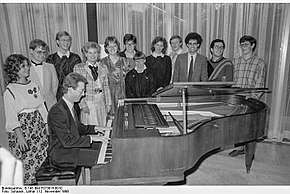Deutscher Musikwettbewerb
The Deutscher Musikwettbewerb (German music competition; German: [ˈdɔʏtʃər muːˈziːk vɛtbəvɛrb]) is a national music competition in Germany for classical soloists and chamber music ensembles held annually by the Deutscher Musikrat (German Music Council). It was first held in 1975 and is considered the most important competition for young musicians in Germany. The instrumental categories vary, and an extra prize is given for compositions. In even years the competition takes place in Bonn, where the Musikrat is based, and in the other years in a different German town.

Award winners not only receive monetary awards but also long-term sponsorship and support through the Musikrat, including the opportunity to perform in concerts, record CDs and recommendations to perform with orchestras as soloists.
Recipients (selection)
1980
- Michael Tröster (guitar) [1]
2002
- ensemble amarcord
2006
- Nils Mönkemeyer (viola)
- Nicholas Rimmer (piano accompanist)
- Quartet New Generation (recorder quartet)
2007
- Johannes Fischer (percussion)
2008
- Sonic.art
2009
- Byol Kang (violin)
- Boris Kusnezow (accompanist) [2]
2011
- Miao Huang (piano)
- Lars Karlin (trombone)
- Trombone Unit Hannover (trombone octett)
- Julian Lembke, Benjamin Scheuer (composition)
2012
- Tobias Feldmann (violin)
- Rie Koyama (bassoon)
- Koryun Asatryan, Asya Fateyeva (saxophone)
- Duo Gerassimez (duo cello/piano)
- Daniel Moreira, Sascha Thiele (composition)
2013
- Jonas Palm, Janina Ruh (cello)
- Rubén Durá de Lamo (tuba)
- Sabrina Ma (percussion)
- Dominik Susteck, Kathrin Denner (composition)
2014
- Frank Dupree (piano)
2015
- Wies de Boevé (double bass)
- Bettina Aust (clarinet)
- Damian Scholl (composition) [3]
2016
- Katharina Konradi (soprano)
- Raphaela Gromes, Valentino Worlitzsch (cello)
- Simon Höfele (trumpet)
- Constantin Hartwig (tuba)
- Tobias Klich, Tamon Yashima (composition) [4]
2017
- Tillmann Höfs (French horn)
- Juri Schmahl (oboe)
- Elias Jurgschat, Steven Heelein (composition) [5]
2018
- Ioana Cristina Goicea (violin)
- Theo Plath (bassoon)
- Maciej Frąckiewicz (accordion)
- Eliot Quartett (string quartet)
- Francesco Ciurlo, Ling-Hsuan Huang (composition) [6]
2019
- Konstantin Krimmel (baritone)
- Sebastian Fritsch (cello)
- Friedrich Thiele (cello) [7]
References
- Gerd-Michael Dausend: „Ich habe mir einen sehr ökonomischen Arbeitsstil angewöhnen müssen ...“ Ein Interview mit Michael Tröster. In: Gitarre & Laute, vol. 10, 1988, book 4, pp. 8–15.
- "Deutscher Musikwettbewerb: Abschluss mit hochkarätiger Preisverleihung" (in German). nmz.de. 22 March 2009.
- Mit Aussicht auf Klassikkarrieren, Neue Musikzeitung 5/2015
- Musikalische Glanzleistungen, Bonner Generalanzeiger, 18 March 2016
- Zwei Solisten gewinnen Deutschen Musikwettbewerb, Musik heute, 9 March 2017
- Namen, die man sich merken sollte, SWR, 16 March 2018
- Deutscher Musikwettbewerb 2019 entschieden, WDR, 8 March 2019